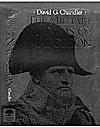
The following is excerpted from David G. Chandler's ROTC Officer's Commissioning Ceremony speech, 11 June 1970, at Ohio State University, to which he referred in the text of the interview. Readers may find it interesting that a British citizen commissioned U.S. military officers. Note Chandler's remarks citing Napoleon.
The profession of arms has long been a distinguished and honorable vocation, although the social background and the emphasis on the requisite qualifications for an officer have inevitably shifted from generation to generation.
In the 16th and 17th Centuries, an officer was either a noble aristocrat, personified perhaps by Sir Philip Sidney, the epitome of the "very perfect, gentle knight" in the reign of the first Elizabeth, or else a hard-bitten, ruthless, swashbuckling mercenary, whose sword and temporary loyalty were available to the highest bidder regardless of nationality or cause. One such in the mid-17th Century was the notorious Croatian rogue, Captain Carlo Fantom, who bore the insalubrious nickname of "the Great Ravisher."
It is fitting to record, however, that his lurid career caught up with him in the end. After switching sides with brash impunity several times during the English Civil War, he was finally hung by order of King Charles I for excessive ardor in the pursuit of his hobby.
For most of the 18th Century, the average officer's career depended more on the size of his purse and the number of influential friends he could muster in high places, than on the possession of any specific military talents. Brave to the point of folly on days of battle, his less applauded pastimes off duty included duelling, drinking and wenching.
The American and French Revolutions effected a remarkable change which was eventually adopted by almost all countries, namely the concept of la carriere ouverte aux talents [careers open to the talented], the "tools to him who can use them" as Thomas Carlyle interpreted this, the proverbial field-marshal's baton in the private's knapsack. To the quality of personal courage were now added the need for professional aptitude and personal example--criteria which of course remain of the utmost significance for a successful military career down to the present day.
The 19th Century officer was either the citizen-in-arms, typified by the majority of those men who held commissions in your own armies of the Union or the Confederacy, or else the typical "gentleman-officer" of England, whose gallantry in the field was matched by his interest in cutting a dashing part in the Victorian social scene and by his devotion to field sports, hunting, shooting and fishing.
As the century drew to a close, however, ever greater attention came to be paid to sheer professional competence and knowledge and personal leadership--attributes which two World Wars proved to be of the greatest and most vital significance.
Today
Which brings us to today. What of the modern officer? Perhaps in some ways he has a more difficult furrow to plough than any of his military predecessors. As a citizen of a great country he is presently subject to intense pressure from part of the public, which, with more noise than good sense in my opinion, challenges the validity of his profession in the context of modern society, accusing him of being part of that nebulous concept, the "military-industrial complex."
On this subject, I would say this to you: such accusations are in no way a new phenomenon, and history has shown how attitudes can change from one extreme to the other in a short space of time. No army has been subject, in its time, to greater onslaughts of this nature than the British Army, but as the poet Rudyard Kipling graphically described it, writing of the late-Victorian soldier:
-
It's "Tommy this, and Tommy that",
And "Tommy, how's your soul?"
But it's "Thin Red Line of Heroes!"
When the drums begin to roll.
Modern problems and attitudes are doubtless more complex than this, but I consider these lines do illustrate a basic truth of perpetual validity.
In the second place, the modern officer must be able to master the intricacies of the most complicated modern techniques, weapons and communications systems that the fertile brain of Man has so far been able to devise. It is estimated that a modern infantry company including regimental support, can bring down as great a weight of fire (and I do not speak of nuclear weaponry) in a given period of time as a Napoleonic corps d'armee of 30,000 men. In this sense, therefore, perhaps we can say that the Marshal's baton is indeed in the Captain's or Major's knapsack in a very real sense, though unfortunately the equivalent pay seldom, if ever, finds its way into his pocket.
With this greater potential power comes commensurately greater responsibility....I would charge those of you being commissioned today to remember that the new, ever more demanding, intellectual and scientific requirement of modern soldiering have in no way replaced or down-graded the older military virtues which Napoleon used to have embroidered upon the colors of every French Regiment: Honneur, Valeur, Discipline et Patrie [Honor, Valor, Discipline and Patriotism].
These are the ageless, basic requirements for any soldier and above all for any officer. I would particularly ask those of you being commissioned tonight to ponder the words of Field-Marshal Viscount Bernard Montgomery of Alamein, who, when asked what specific qualities go to make a good unit, replied: "There are no such things as good or bad regiments, no good or bad men; just good or bad officers."
More Chandler:
-
Chandler Interview
Chandler's Napoleon The Man
Chandler's ROTC Speech (excerpt), 11 June 1970
Caricatures of Chandler
Nursemaid's Cautionary Song (1830)
Related Interviews:
Back to Table of Contents -- Napoleon #8
Back to Napoleon List of Issues
Back to MagWeb Master Magazine List
© Copyright 1997 by Emperor's Press.
This article appears in MagWeb (Magazine Web) on the Internet World Wide Web.
The full text and graphics from other military history magazines and gaming magazines are available at http://www.magweb.com